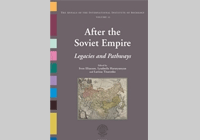
SCAS News - 29 October, 2015
The 12th IIS Annals to Appear Soon - Edited by Former SCAS Fellows
In June 2009, the 39th IIS World Congress was held in Yerevan on the theme ”Sociology at the Crossroads”.
On behalf of the International Institute of Sociology (IIS), SCAS was the main organizer of the congress in
collaboration with the local host, Yerevan State University. The Collegium also funded the congress to a large
extent. SCAS Principal Björn Wittrock was President of
the IIS between 2005 and 2013, and the Collegium
hosted the IIS Secretariat during this period.
Volume 12 of the IIS Annals, which is a result of the Yerevan congress, will shortly be available in print. The
book is
entitled After the Soviet Empire: Legacies and Pathways (Brill, 2015) and is edited by former SCAS
Fellows
Lydumila Harutyunyan and Larissa Titarenko together with Sven Eliaeson.
Lyudmila Harutyunyan is Professor of Sociology at Yerevan State University and was a Fellow in residence
at SCAS in the spring of
2008 and in the spring of 2009. Larissa Titarenko is Professor of Sociology at
Belarusian State University in Minsk. She spent time as Fellow at the Collegium in the autumn of 2006.
Sven Eliaeson is Senior Research Fellow at the Uppsala Centre for Russian and Eurasian Studies at Uppsala
University .
ABOUT THE BOOK:
"The break-up of the Soviet Union is a key event of the twentieth century. The 39th IIS congress in
Yerevan 2009 focused on causes and consequences of this event and on shifts in the world order that
followed in its wake. This volume is an effort to chart these developments in empirical and conceptual
terms. It has a focus on the lands of the former Soviet Union but also explores pathways and contexts
in the Second World at large.
The Soviet Union was a full scale experiment in creating an alternative
modernity. The implosion of this union gave rise to new states in search of national identity. At a time
when some observers heralded the end of history, there was a rediscovery of historical legacies and a
search for new paths of development across the former Second World.
In some parts of this world
long-repressed legacies were rediscovered. They were sometimes, as in the case of countries in East
Central Europe, built around memories of parliamentary democracy and its replacement by authoritarian
rule during the interwar period. Some legacies referred to efforts at establishing statehood in the wake of
the First World War, others to national upheavals in the nineteenth century and earlier.
In Central Asia and
many parts of the Caucasus the cultural heritage of Islam in its different varieties gave rise to new markers
of identity but also to violent contestations. In South Caucasus, Georgia, Armenia and Azerbaijan have
embarked upon distinctly different, but invariably contingent, paths of development. Analogously core
components of the old union have gone through tumultuous, but until the last year and a half largely
bloodless, transformations. The crystallization of divergent paths of development in the two largest republics
of that union, i.e. Russia and Ukraine, has ushered in divergent national imaginations but also in series of
bloody confrontations."
Read more about the book
Read more about the International Institute of Sociology (IIS)






